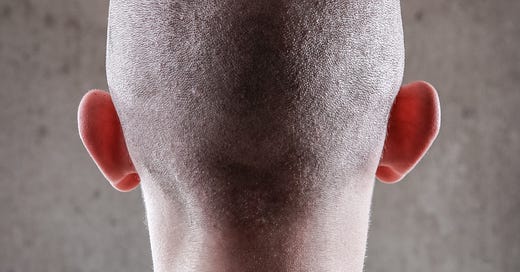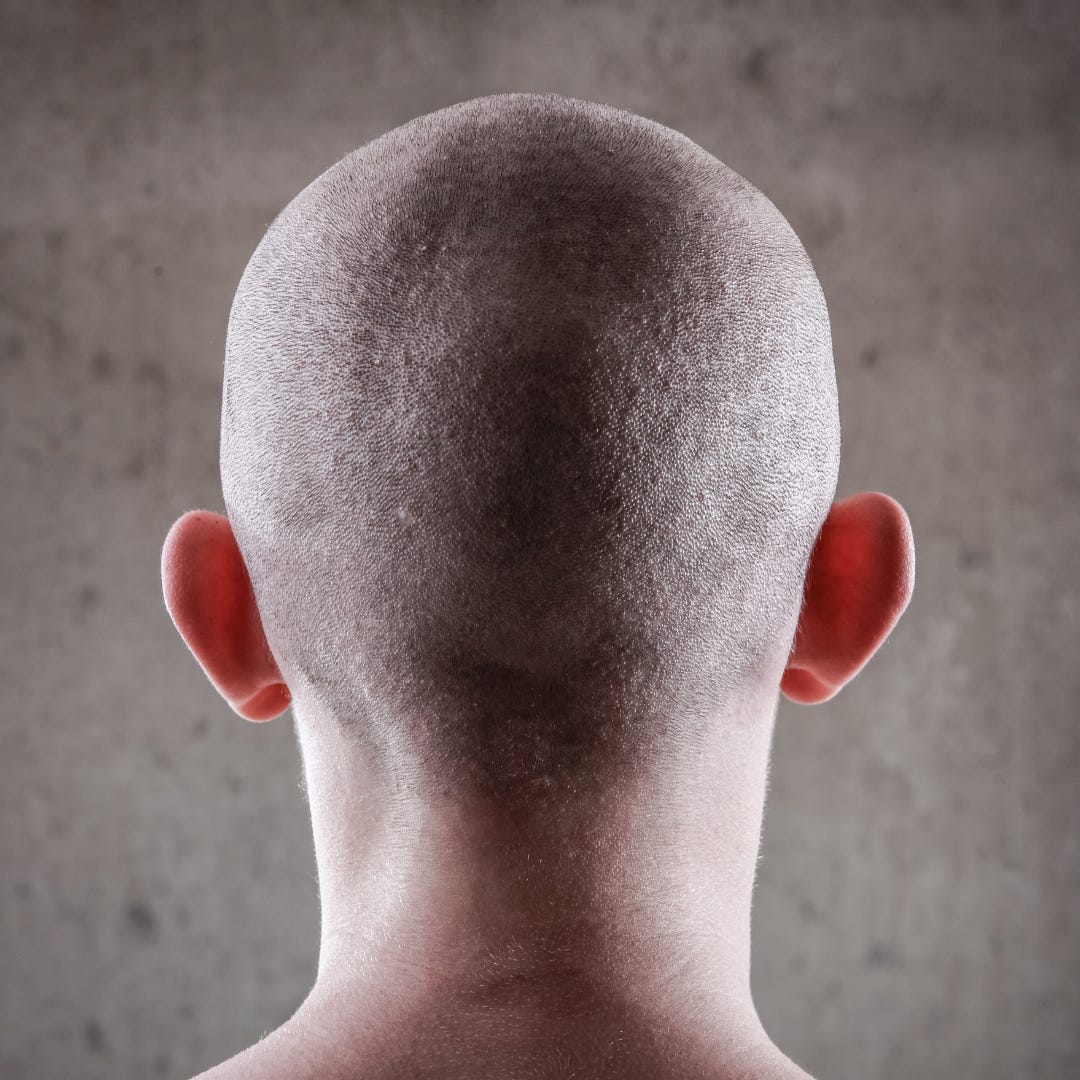The Hunt, Chapter 10: Hair Loss
What happens in Vegas doesn't stay in Vegas, if the court grants a motion for relief from electronic monitoring.
This is Chapter 10 in The Hunt, our ongoing serial. Read the Chapter 9 here, and Chapter 6, the Errant Pube, here.
Justin didn’t know why the petition for hair testing was denied. I couldn’t figure it out, either.
Looking at the statute, and the docket, without engaging in any legal analysis1 whatsoever, there were two possibilities:
The prosecution might have argued that testing was unnecessary, as “identification” was not at issue. The prosecution hadn’t argued or presented testimony at trial that the pubic hair was consistent with Mr. Mousers; by extension, how could disproving that association be dispositive of guilt or innocence?2
The testing might have been denied as futile. There might have been no root, or associated tissue appropriate for testing in 2005. Shed hairs – hairs that fall out naturally, rather than being plucked or pulled– tend to lack appropriate tissue for DNA testing. But this hair was wrapped around a bent-back fingernail, not perched atop a sliver of scum-slick soap in a shower stall. Torn, rather than shed, wasn’t impossible.
If a question has two answers, and one means “fuck it, game over,” and the other is a possible path forward, why not keep going?
Maybe, the DNA testing wouldn’t be so heartily opposed, if it wouldn’t just exculpate Mr. Mouser, but inculpate3 someone else. Who wouldn’t want a better suspect, a likelier story, and ready-made proof handed to them on a silver platter?
Between 2009 and 2013, about half of U.S. states passed laws requiring the collection of DNA samples from sex offenders, arrestees, and others. If two of three boyfriends were sex offenders – one, apparently, required to register for life – they might have reoffended in an appropriate jurisdiction, resulting in a DNA sample on file.
Before I got involved, Justin created a kind of a multi-dimensional timeline for each “boyfriend,4” resulting in both a rough biographical sketch and list of connections and aliases, gleaned from court documents, dockets, newspaper clippings, and other matter. (The techniques — and rationale — for doing this have been discussed previously on Bullshit Hunting5).
Brian Hair was easier to start with, and his alibi was worse.
Brian Hair: Somehow, not a pseudonym
Brian Allen Hair, who also occasionally used the names “Amerson” or “Anderson6” was born in August of 1976, making him six years older than Genna. Per testimony at trial, recounted in the habeas petition, Hair had been convicted of misdemeanor sexual battery, requiring him to register as a sex offender for life. He’d also been convicted of felony theft and lying to a police officer.
During his initial interview, Hair lied to police about knowing Genna, then lied about his alibi, saying he’d “spent the weekend in Ripon with a girl named Melissa,” and then on reinterview supplied a story about playing softball in Manteca. Years later, at trial, alibi witnesses had fuzzy memories and endorsed his story only in the mildest terms.
Chasing loose hairs
Based on newspaper articles, the few public records obtained, and the testimony recounted in the habeas petition, Hair should have been easy to find. We had his name, favorite aliases, and birthday, and he was statutorily required to register his current address with the state of California.
But, despite the statement that he was a sex offender, who’d have to register for life – he didn’t show up on the registries. There were no recent cases against him in Stanislaus, or surrounding counties – which is a big deal, as California’s unified court system means that evictions, traffic tickets, indictments, small claims cases, and collections matters all end up in the same court as felony prosecutions and civil litigation.
A move was a possibility. Out of state.
Hair had family in Oklahoma, and, perhaps, an open warrant in Nevada.
Great news, as Nevada has a DNA-collection regime, modern courts with standardized dockets (kind of), and generally sweet and helpful court staff and records officers. For someone who doesn’t gamble, I have a real soft spot for Clark County, Nevada.
And Clark County was where we started to find him.
Las Vegas Metro PD arrested Hair on an out-of-state warrant in December of 2016. Extradition was waived five days later, and Hair was loose, again.
Hair popped up again in 2019, arrested for misdemeanor battery. The Las Vegas Metro PD supplied a lovely set of police reports, sufficient to identify him as “our” Hair; however, a misdemeanor arrest wouldn’t lead to DNA collection in Nevada. A shame.
About a year later, Hair was charged with failure to register in Clark County, Nevada. A misdemeanor. He was arrested, and the charges were dismissed – as they apparently often are – when he’d sat in pretrial detention longer than he’d be jailed if convicted. DNA collection would be unlikely.
But in July of 2020, Hair was charged with “uttering” and possession of a “financial forgery laboratory.” Felonies. Hair spent what seemed like a long weekend in jail, and was released with electronic monitoring and a solemn promise to stay off the strip. At his request, electronic monitoring was discontinued in October of 2020.
Hair split, shortly after he was relieved of his ankle bracelet. He failed to show for his next court date. His bond was forfeit.
We requested information concerning the “uttering7” and “financial forgery laboratory” charges; the Las Vegas Metro PD reported that these cases remained open as to the co-defendant and claimed exemptions from the relevant public records laws.
People tend to go where they’ve been, so I looked for him in Oklahoma.
And that’s where I found him.
Two years dead.
A court proceeding had been opened by a relative in the District Court for Muskogee County in late 2022 and closed in February of 2023, seeking disposition of Hair’s interest in a bit of tribal land.
The information in the court file was consistent with the Clark County arrest records, which were consistent with the Stanislaus County testimony, which were consistent with Justin’s timeline.
Right Hair. Wrong time.
Because, like I said, none of this is the practice of law. Just shit-stirring.
For real, though, this is such a ridiculous argument. Imagine being a teenager, emerging from the shower with someone else’s pubic hair under your fingernail, and just going about your day. Absurd.
Positive association of the pubic hair with someone outside the Mouser/Gamble household would disrupt the prosecution’s theory of the case by changing the entire timeline. Still, the statute requires “identification” to be at issue.
Fuck you, this is a word.
I hate this. “Boyfriend” is the term used in the habeas petition, and as an advocate, I understand why, but it’s gross. The idea that the interests of victims and the wrongfully convicted are inherently adverse is a sack of body-warm garbage sold by people hostile to the idea that “the truth” is anything other than a category of goods to be sold to a jury.
See, e.g., https://www.bullshithunting.com/p/freak-in-the-google-sheets-building
Never – ever – doubt that lawyers and judges will get the spelling and pronunciation of witnesses, or even parties, names wrong. And once they’re set in the record, they rarely change
“Uttering a forged instrument” usually means cashing or paying for goods or services with a check expected to be dishonored. Sometimes it means other things.




